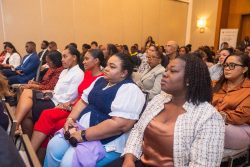NEAR KREMINNA, Ukraine, (Reuters) – Ukraine’s future hinges on the outcome of battles in the east, including in and around Bakhmut, President Volodymyr Zelenskiy said, with both sides describing brutal fighting in the small city as Russia intensifies a winter campaign to capture it.
The ruined mining town of Bakhmut has become the focus of Russia’s invasion, with the months-long fight for it becoming Europe’s bloodiest infantry battle since World War Two.
“It is very tough in the east – very painful,” Zelenskiy said in a Monday video address that he has held nightly since Russia launched its invasion more than a year ago.
“We have to destroy the enemy’s military power. And we shall destroy it.”
Separately, in what would be the first international war crimes cases arising from the invasion, the International Criminal Court (ICC) is expected to seek the arrest of Russian officials for forcibly deporting children from Ukraine and targeting civilian infrastructure, a source told Reuters.
Russia would be certain to reject arrest warrants against its officials, but an international war crimes prosecution could deepen its diplomatic isolation over a campaign that has killed thousands of civilians and driven millions from their homes.
Russia, however, appeared on the cusp of one long-sought diplomatic breakthrough with sources telling Reuters that China President Xi Jinping could visit Russia as soon as next week.
The Chinese foreign ministry did not respond to requests for comment. The Kremlin said it had nothing to announce yet.
On the battlefront, Ukrainian soldiers said on Monday they were repelling attacks near Kreminna, north of Bakhmut.
In a forest some 8 km (5 miles) from the front, cannons boomed, targeting enemy positions to the northeast. Explosions rumbled constantly in the distance.
Reuters reporters saw a soldier being brought from the front with a badly wounded leg. He was stabilised in a van with a splint and painkillers before being taken back to a medical centre.
“Two or three weeks ago the fighting was at its peak but it has calmed down a bit,” said Mykhailo Anest, a 35-year-old medic. “There is a lot of artillery and mortar fire.”
Trench warfare, described by both sides as a meat grinder, has claimed a huge toll in Bakhmut, in Donetsk, with both sides reporting hundreds of enemy troops had been killed.
Russia says taking Bakhmut would open a path to capture all of Donetsk, a central war aim. Ukraine, which has decided to defend Bakhmut rather than withdraw, says wearing out Russia’s military now will help its counter-offensive later.
But not every military analyst is convinced that defending Bakhmut is the best strategy for Ukraine.
“As of now we have information that Ukraine is sending reserves to Bakhmut that underwent training in Western countries. And we are suffering losses among reserves that we intended to use for counter-offensives,” Ukrainian military analyst Oleh Zhdanov said in an interview.
“We could lose here everything we wanted to use for those counter-offensives.”
Ukrainian military historian Roman Ponomarenko said the threat of encirclement was “very real”.
“If we simply give up Bakhmut and withdraw our troops and equipment, nothing terrible can happen … if they seal the ring, we will lose men and equipment,” he told Ukrainian radio NV.
Ukraine and its Western allies say Russia has committed “crimes against humanity” by targeting civilians and civilian infrastructure. Russia denies that.
The ICC, which opened an investigation into war crimes in Ukraine last year, is expected to seek its first warrants against Russian officials in relation to the conflict “in the short term”, a source with knowledge of the matter said.
It was unclear which Russian officials the prosecutor might seek warrants against or when they might be issued, but they could include the crime of genocide, the source said.
The ICC prosecutor’s office declined to comment. Russia’s defence ministry did not respond to a request for comment.
Konstantin Kosachyov, deputy speaker of Russia’s upper house of parliament, said the ICC had no jurisdiction over Russia since it withdrew its backing in 2016.
“The ICC is an instrument of neo-colonialism in the hands of the West,” he said.
Russia has pushed back against previous accusations that it had forcibly moved Ukrainians.
But it has not concealed a programme under which it has taken thousands of Ukrainian children to Russia, but presents it as a humanitarian campaign to protect orphans and children abandoned in the conflict zone.
Ukraine says thousands of deported Ukrainian children are being adopted into Russian families, housed in camps and orphanages, given Russian passports and brought up to reject Ukrainian nationality.
The U.N. genocide convention defines “forcibly transferring children of the group to another group” as one of five acts that can be prosecuted as genocide.





